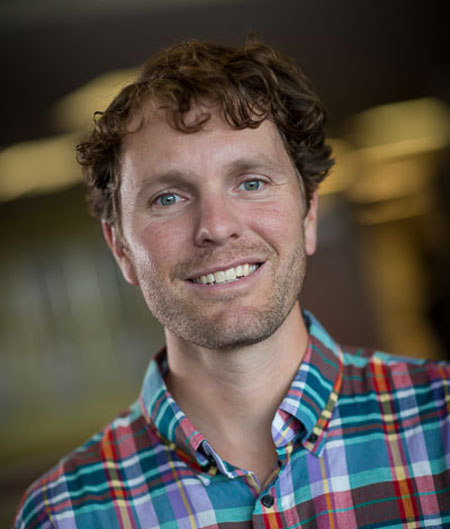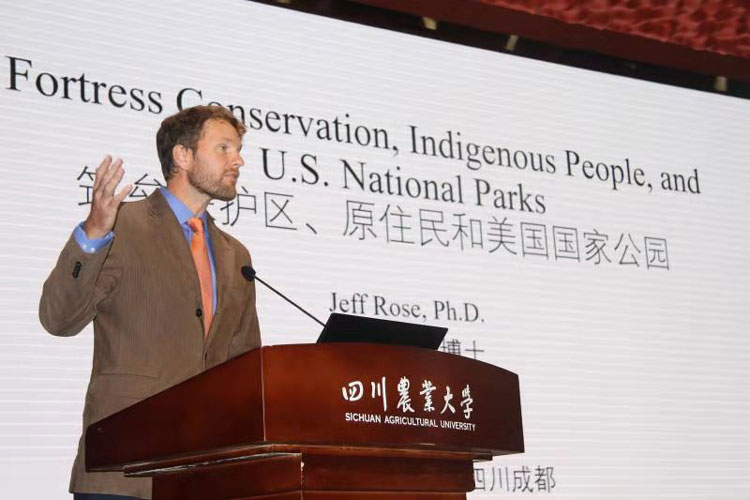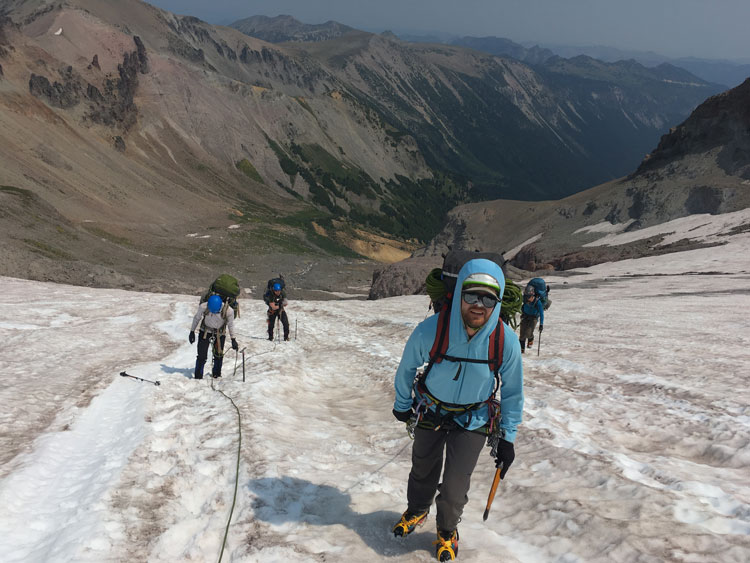Faculty Feature: Jeff Rose

Jeff Rose, Ph.D., is teaching the Environmental Humanities Program’s new Community Engaged Learning course during the Spring ’22 semester. Jeff is an assistant professor-lecturer in the Department of Parks, Recreation, and Tourism and an affiliate faculty with the Global Change and Sustainability Center at the University of Utah. Prior to this position, he taught geography and environmental studies at Davidson College in North Carolina.
Jeff’s research agenda uses political ecology to take a social and environmental justice approach to nature-society relations. His research tends to leverage qualitative and spatial methods to examine systemic inequities expressed through class, race, political economy, and relationships to nature. He has pursued a diverse set of questions that critically examine issues of public space, productions of nature, connection to place, neoliberalism, and various non-normative behaviors. A primary focus of Jeff’s research is exploring the social and environmental justice elements of homelessness across the urban-wildland interface. However, this critical approach is also applied to a number of other settings, including park and protected area management, adventure and outdoor recreation and education, and social-ecological systems.
Jeff's teaching experiences critically examine nature-society relationships, employing community-engaged learning with often underrepresented communities whenever possible. He has instructed courses in political ecology, critical social theory, wilderness, qualitative research methods, environmental social studies research methods, leadership, youth development, and people, place, and the environment, among others.
In February, I spoke with Jeff about community engagement, his research on homelessness and nature-society relations, and the course he’s currently teaching for the Environmental Humanities Program.
Brooke: What drew you to community engaged research as a methodology, and how do you employ that method in your own research?
Jeff: That type of research does something. I think it's really important that our research is not just generating new knowledge for the sake of generating new knowledge. When I was in graduate school, I was exposed to a number of community engagement, participatory action frameworks for thinking about research. Those were just so much more compelling to me than a more removed or clinical approach to research. Community engaged research felt so much more real, so much more lively, so much more dynamic, so much more relational between the researcher and participant or co-researchers. It was just really captivating. A lot of times your research will generate a paper or a presentation, and there's something valuable about that. But there's something that seems even more meaningful when we can have practical results on the ground. I think community engaged research, community engagement in general, is much more likely to lead towards felt experiences and felt changes in the community. So, I just find it more rewarding.

Brooke: Your research spans issues of environmental justice, homelessness, outdoor recreation. What research projects are you working on now?
Jeff: Earlier this afternoon, we submitted a report to the Jordan River Commission. We just completed some research on unsheltered homelessness along the Jordan River. We understand quite a bit about drivers of unsheltered homelessness broadly—housing markets, labor markets, difficulties associated with personal problems. But we don't really know much about why encampments emerge where they emerge. What is it about a particular place? Is it about access to particular resources? Is it about being away from certain impediments? So, we are working with the Jordan River Commission to try to find out some of that information. I was working with a couple of graduate students, Rebecca Hardenbrook and Angelina De Marco, who are really talented students. We did a bunch of surveys and interviews with folks living along the river. This was one of those times where the relationships really mattered. Instead of just swooping in, doing a survey, and walking away, we spent much more time in the community, reflecting on that time in the community, and trying to engage in something like reciprocity with a group of people that is certainly marginalized and just overlooked in general. We’ve been doing that research for a little over six months.
There are some fascinating findings. I think one of the concerns is, what is the health of the Jordan River? What does that mean for people who are living particularly close to the river? If the river is unhealthy, is that making unhealthy humans who are living directly adjacent to it? And subsequently, are people living directly adjacent to the river having a negative impact on the river itself? Are people getting into the river? Are people using the water for cooling, or for cleaning, or other kind of provisioning services? The answer is largely that people are not necessarily using the river in that way. It is a little bit cooler, and there's a little bit more shade there, so I think that's a resource in the summertime. But largely, it's unbuilt space. People are attracted to the openness. There's a little bit of a lack of surveillance around that area.
The other thing really striking from our interviews is the durability of homelessness. Despite abatement efforts from the city and displacement events that people have faced, people were drawn to the river and people are going to continue to live there if they're experiencing unsheltered homelessness. So, we're encouraging environmental managers and city officials to really understand homelessness as part of the landscape and incorporate this into their management. We're not going to eradicate homelessness. We're not going to push it out of sight, out of mind. So, if it's going to be a part of our community, then how is this a group that we can work with in some meaningful ways?
Brooke: How did you come to this research topic? What is the potential for more research on homelessness within the field of Environmental Humanities?
Jeff: I read a book about 15 years ago that was talking about homelessness as a bellwether for issues of urban justice. It said if we could understand how we, as a society, treat people who are experiencing homelessness, then that's a statement about public space, the availability of public space, and the confines that we place on public space. I've long been a fan of public space. I used to think about public space as national parks, national forests, big, wide open expanses. I've expanded that notion to think about the smaller public spaces that are absolutely vital, not just for our lived experience in the city, but for democracy. Public space is a space of democracy, it is a space of diversity, it is a space of interacting with people who may not look like me or may not talk like me or may not have the same background or belief as me. A vibrant public space in inner cities can be something like justice and something like democracy.
From that framework, I started to home in on homelessness as a subject, and specifically unsheltered homeless because of the rawness of that experience. I spent a lot of time working with this community and interacting with this community. It’s a lived experience that is incredibly intimate with the nonhuman natural world. Little changes in weather, little changes in air quality, little changes in the people who navigate through public space can have big impacts on people's lived experiences. So, to me, it is a no brainer for Environmental Humanities to be actively engaged with these types of topics. Unsheltered homeless people are folks who are at the most visceral end of nature-society relations. Understanding, thinking through, and narrating some of those experiences is a fundamental contribution to knowledge.
Brooke: You're a professor in the Parks, Recreation, and Tourism department. Over the years, various students in our program have taken courses in PRT. What intersections do you see between Environmental Humanities and Parks, Recreation, and Tourism?
Jeff: I think one of the real privileges in 2022 is that for many people outdoor recreation is the way they come to know the non-human natural environment. I think my grandparents, certainly my great, great grandparents, and lots of people and cultures around the world came to know the environment in a different way where it's part of their labor, their sustenance, the provisioning for their community or family. For many of us, we now live this privileged lifestyle where we don't grow our own food, we don't chop down the wood for our houses. Many of us don't really engage with the natural world in such an intimate way on a daily basis, except perhaps through outdoor recreation. So, I'm particularly interested in outdoor recreation as a mechanism for facilitating nature-society connections. Often, we present that in a positive way. The more time you spend in nature, the more time you spend in a particular environment, the more a sense of place or place attachment you might have for a particular landscape. I certainly adhere to that. But I'm also critical of those perspectives.
Outdoor recreation can be such a wonderful way to know a landscape, but it can also be a very limited way to know a landscape. For example, so many of my students and friends say, ‘We got to save the Wasatch for its skiing. We got to save the Wasatch for its climbing, for its hiking, for its mountain bike trails.’ I'm on board with that. I want to save the Wasatch, I want to support the Wasatch, I want to nurture the Wasatch for all those recreational opportunities. But I also think it's important to support local landscapes for reasons that have nothing to do with recreation. One of the things I try to do in Parks, Recreation, and Tourism is straddle the fence between being a cheerleader ‘rah, rah, Parks and Rec is good,’ and reminding ourselves that's a limited approach. We can also think about this in a broader sense and a more critical sense, where we start to think about issues associated with outdoor recreation. Probably first and foremost is class privileges. We could also think about race, gender, geography, education, or disability.

Brooke: What are your hopes for the community engaged learning course this semester?
Jeff: I'm excited about the community engaged learning course. I'm hoping for us to think carefully about community engagement and the power relationships that are associated with that. I find that the students already do such a good job with that. I'm trying to just provide some academic support for a lot of the things that they're already doing. They're talented, well read, they're thinking critically. The subtitle of the course is ‘Place, Race, and the Environment.’ So, one of the things we're trying to do is center race in this conversation. I'm interested in reminding my students and reminding myself that race includes whiteness. There are very few, if any, racially neutral terrains. We’re combining race and connection to place, centering things like racial identity, Indigeneity, and the political relationships that shape the environment. At the same time, students are doing their own community engagement projects. I think some of the students came into the course with pretty solid community engagement relationships already established. I'm trying to be open with them to let them imagine what community engagement might look like and what kind of relationships they want to foster, extend, or sustain.
Categories
Featured Posts
Tag Cloud
- alumni (4)
- snow (1)
- winter (1)
- climate change (2)
- writing (4)
- creative writing (1)
- book (1)
- memoir (1)
- Great Salt Lake (6)
- symposium (1)
- event (1)
- community engagement (8)
- water (3)
- faculty (5)
- research professor (1)
- history of science (1)
- coevolutionary studies (1)
- American West (1)
- history (1)
- Native history (1)
- public history (1)
- energy (1)
- art (2)
- environmental justice (3)
- just transition (1)
- student (3)
- Great Salt Lake Symposium (1)
- Indigenous (1)
- practitioner-in-residence (2)
- narrative strategy (1)
- political science (1)
- communications (1)
- Mellon Community Fellowship (1)
- environmental health (1)
- air quality (1)
- disability justice (1)
- philosophy (1)
- science (1)
- Anthropocene (1)
- West Desert (1)
- Pony Express (1)
- bicycling (1)
- environmental communication (1)
- queer ecology (1)
- wildfire (1)
- climate communication (1)
- science communication (1)
- forests (1)
- Indigenous sovereignty (1)
